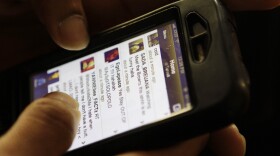Zoe Chace
Zoe Chace explains the mysteries of the global economy for NPR's Planet Money. As a reporter for the team, Chace knows how to find compelling stories in unlikely places, including a lollipop factory in Ohio struggling to stay open, a pasta plant in Italy where everyone calls in sick, and a recording studio in New York mixing Rihanna's next hit.
In 2008, Chace came to NPR to work as an intern on Weekend Edition Saturday. As a production assistant on NPR's Arts Desk, she developed a beat covering popular music and co-created Pop Off, a regular feature about hit songs for Morning Edition. Chace shocked the music industry when she convinced the famously reclusive Lauryn Hill to sit down for an interview.
Chace got her economic training on the job. She reported for NPR's Business Desk, then began to contribute to Planet Money in 2011. Since then Chace has also pitched in to cover breaking news for the network. She reported live from New York during Hurricane Sandy and from Colorado during the 2012 Presidential election.
There is much speculation on the Internet about where Chace picked up her particular accent. She explains that it's a proprietary blend: a New England family, a Manhattan childhood, college at Oberlin in Ohio, and a first job as a teacher in a Philadelphia high school.
The radio training comes from the Salt Institute for Documentary Studies, and collaboration with NPR's best editors, producers and reporters.
-
President Obama is asking a group of CEOs to pledge not to discriminate against the long-term unemployed. But new research suggests that these job seekers may face an even greater challenge — many of them are not even being considered by employers. Our Planet Money team looks into the research and challenges facing these job seekers.
-
How Perverse Incentives Drive Up Health Care CostsMedical treatment in the emergency room is expensive, but there's a perverse incentive at work which encourages EMS workers to send more people there. Medicare reimburses for 911 calls only if the patient is transported to the ER. A pilot program at Mt. Sinai Hospital in New York City tries to keep patients from coming back to the ER.
-
An obscure provision in the finance overhaul is causing problems for small banks. It turns out, it's hard to figure out which risks banks should be allowed to take.
-
In order to get the North American Free Trade Agreement signed 20 years ago, a specific trade-off was made. The trade-off would not protect U.S. jobs from moving overseas.
-
Bangladesh is the cheapest place in the world to make a T-shirt. But this month, the minimum wage there will rise from $39 a month to $68 a month. That's got some factory owners nervous about whether Western retailers there will pull out.
-
The business that transformed the nation is the product of an obscure but hugely influential trade deal — and a cultural struggle over Korean food.
-
The rise of factory jobs in Bangladesh has brought profound cultural changes to the country — and to the lives of two sisters who made the Planet Money T-shirt.
-
One thing Twitter has that other social networks don't: Users who talk about the world in real time. That could be worth a lot.
-
Eugene Fama, Lars Peter Hansen and Robert Shiller won the 2013 economics prize for their work on developing new methods to study trends in asset markets. They will share the $1.25 million prize.
-
In this "Planet Money" report, we learn about a man many call an outlaw. His crime? Growing raisins and then selling them all. For the last 10 years, he's violated the law and gone against the Raisin Administrative Committee.




